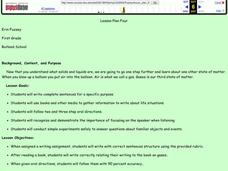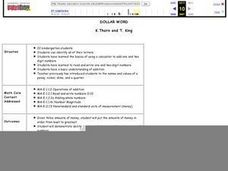Curated OER
Estimating Solutions
Finding approximate solutions to word problems allows users to assess the reasonableness of their answers. In a well-paced lesson, the class rounds numbers to estimate the solutions. They explain their thinking and determine if the...
Curated OER
Out of the Dust: Questioning Strategies
Bloom's Taxonomy is a great way to address the many levels of comprehension. With explanations and examples of each level, you can create questions that focus on knowledge, comprehension, application, analysis, synthesis, and evaluation.
Curated OER
Writing Skills: Fables
Use fables as a fun way for English Language Learners to gain confidence and fluency in their reading and speaking skills. After reading a fable in class, they retell their story to a group of their peers. When this jigsaw activity is...
Curated OER
Highs And Lows
Learners experiment to examine high and low pressure areas. They investigate why a high pressure area seeks a low pressure area.
Curated OER
When Average Is the Way to Go
Students engage in experiences involving the mathematical concept of averages. After watching a video, students explore averaging through a variety of different methods.
Curated OER
Measurement: Cylinders
Math scholars observe and demonstrate how to calculate the surface area and volume of cylinders. They analyze pictures of various cylinders on a handout, solve problems on two worksheets independently, and discuss the answers to the...
Curated OER
Geometry: Lesson 8
Eighth graders engage in a instructional activity that is concerned with the finding of angles that are found in different two dimensional figures. They compare and contrast exterior and interior angles while also determining the unknown...
Curated OER
Sex Stereotypes in Society
Students analyze a collection of advertisements or photographs in a text or magazine and identify the stereotypes used or possible biases of the editors. They discuss how these stereotypes are formed, and the ways in which they impact...
Curated OER
Matter
First graders are read a story about the various stages of matter with a focus on gases. Using a ziploc bag, they capture as much air as possible and discuss how it takes up space even though it is invisible. To end the lesson, they blow...
Curated OER
Modals - Passive Voice
In this passive voice worksheet, grammarians fill in the blank with the passive voice of the verb in the parentheses. They then change nine sentences from the active voice to the passive voice. Three exercises develop understanding for...
Curated OER
Pride And Prejudice: Anticipation Guide
In this anticipation guide worksheet, students thoughtfully mark statements according to whether they disagree (D) or agree (A). Students will mark the same 7 statements before and after they read Pride and Prejudice.
Curated OER
Who/Whom Usage Practice
In this who and whom practice worksheet, young scholars read an informative activity. Students then respond to 10 questions that require them to use who and whom appropriately.
Curated OER
Who / Whom Practice
In this nominative and objective pronouns worksheet, young scholars read the rules for using "who" and "whom". Students read ten sentences and indicate which word is correct for each.
Curated OER
The Outsiders: Anticipation Guide
The Outsiders by S.E. Hinton is always a favorite for middle and high school readers because it addresses issues that hit home to them, decades after the book is set. Have learners fill out an anticipation guide that encourages them to...
Curated OER
Data Analysis, Probability, and Discrete Math
Choose to supplement your probability unit with this resource and you won't be disappointed with the outcome. Teach young mathematicians to organize information using tree diagrams and lists in order to determine the possible outcomes of...
Curated OER
Hoot: List-Group-Label
Word association is a great way to explore vocabulary and new ideas. In a unit about Carl Hiassen's Hoot, kids think about the word environmentalist and come up with additional words that they associate with environmentalism on...
Curated OER
Proverbial Picture Pages
Examine the meaning of the word proverb, and then choose proverbs from a list. The list is not provided, but there are several resources listed here to find a variety of proverbs. Then have your learners explain the meaning of each...
Curated OER
Packing Nouns
Play a noun game with your class. Put a suitcase in the middle of the room and have each class member, in turn, name a noun that begins with a specified letter of the alphabet. To ramp up the challenge, assign concrete, abstract, proper,...
Curated OER
Capacity: Gallon, Quart, Pint, Cup
Young measurers identify gallons, quarts, pints, and cups, then determine equivalent measurements for capacity using customary measuring tools.
Curated OER
What on Earth is in the Earth?
Students explore the physical properties of sand, soil, and rocks and sort, classify, compare, and contrast the materials found in the soil. The differences between the living and non-living parts of the soil is discussed.
Curated OER
United Nations: What It Does for Us
Fifth graders will understand what the United Nations Organization does and will be able to identify the aims and purposes of the United Nations. They recognize the seven key areas of the Millennium Declaration.
Curated OER
Dollar Word
Students review the value of coins prior to adding up values to equal one dollar. Letters of the alphabet are assigned monetary values and students use calculators to add up the value of a word. Students work with a partner to try and...
Curated OER
Beyond Demographics
Students study the culture of the Dominican Republic. In this Peace Corps lesson, students watch, "Destination: Dominican Republic." Students also examine primary source materials on the nation and discuss their findings.
Curated OER
Highs and Lows
Plot data using the number line and discuss how negative numbers are used in math and science. Sixth and seventh graders share their graph with the class and provide an explanation for their plotting.























